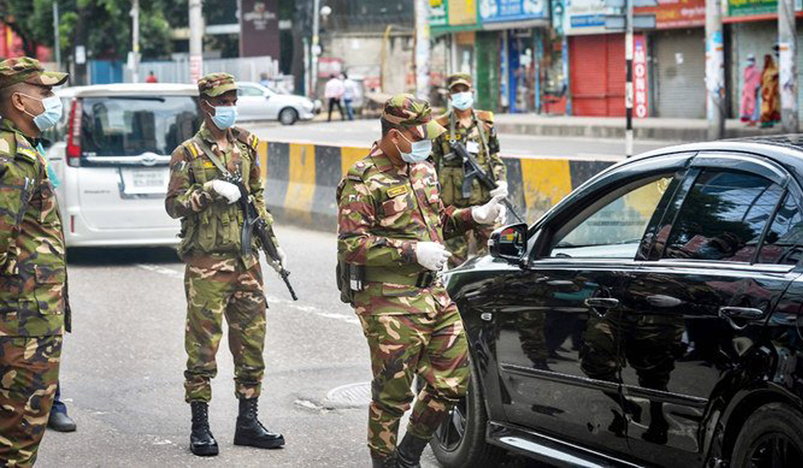
Security personnel positioned on the road to enforce a lockdown imposed by the Bangladesh's government to curb the spread of Covid-19 coronavirus in Dhaka on July 23, 2021. (AFP)
Bangladesh on Friday imposed a two-week nationwide lockdown after having eased coronavirus disease (COVID-19) restrictions to allow millions of people to travel for Eid Al-Adha celebrations.
Authorities had lifted measures on July 13 in consideration of “the need to maintain normal economic activity” and allow for the second-most important religious holiday in the Muslim-majority country to go ahead relatively unhindered, despite a surge in virus cases and deaths.
The highly infectious delta variant of COVID-19 has contributed toward pushing up the rate of positive tests in the south Asian nation to more than 31 percent.
At least 1.14 million people among Bangladesh’s population of 169 million have contracted the virus since the pandemic outbreak and nearly 19,000 have died, 166 in the past 24 hours. However, figures on recorded cases and deaths are thought to be grossly underreported.
Farhad Hossain, state minister for public administration, said on Thursday the latest lockdown would be stricter than before, with not only all government and private offices shut, but also garment factories. During the previous lockdown, the garment sector, which is the country’s largest source of income, was allowed to operate.
“Offices, courts, garment factories, and all other export-oriented industries, everything to be precise, will remain closed,” Hossain added.
He pointed out that those who had traveled to their villages for Eid, would not be allowed to return to the cities until Aug. 5.
Although the lockdown is now again in place, health experts fear damage will already have been done by the government’s decision to lift preventive rules for Eid.
Prof. Dr. Alamgir Chowdhury, principal scientific officer of the Institute of Epidemiology Disease Control and Research (IEDCR), told Arab News: “The lockdown restrictions were lifted at a moment when we just started noticing a downward trend in the positivity rate.
“But now it will increase again, as people from the cities rushed to their villages, flouting health and safety protocols in the last week.”
And Prof. Dr. A.S.M. Amanullah, a public health expert at the University of Dhaka, said that while the country was currently recording between 10,000 and 15,000 new daily infections, the real figures were likely to be “much higher.”
“In this situation, lockdown may not work to bring the infection rate down. A strict curfew for four weeks and acceleration of mass vaccination may help Bangladesh control the delta variant by September.
“It was not wise to relax the lockdown restrictions during Eid Al-Adha. Health authorities didn’t care about the advice of the national COVID-19 control committee. As a result, it is only a matter of time before there is a surge in new infections, probably in the next two weeks,” he added.
While businesses are expecting huge losses from the lockdown, especially in the garment industry, some economists claim the situation would have been worse had there been no restrictions.
Dr. Mostafizur Rahman, of the Center for Policy Dialogue, an NGO involved in economic research, said: “Bangladesh needs a circuit-breaker for this second wave of coronavirus. If this wave continues for a longer period, the country may face a negative branding as a hotspot of COVID-19 infections which will be even worse in the long run.”
He noted that the government had taken some difficult decisions, especially as the country had received numerous apparel orders for the coming winter season.
“To make up for the losses of this lockdown, manufacturers may consider increasing working shifts at their factories. Some factories may require air shipments to meet buyer delivery times and the government may facilitate this.
“Port facilities should also be prepared on a high-priority basis for exporting the garment products while the lockdown is lifted,” Rahman added.
Leave a comment